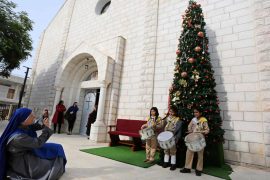1) At the INSS, Eden Kaduri analyses ‘The Campaign between the Wars in Syria’.
“The Campaign between the Wars (Mabam, in its Hebrew acronym; hereafter CBW) has been conducted by the IDF and other security bodies for about a decade, as a campaign serving Israel’s security interests in routine times. It entails a series of actions, whether kinetic or cyber or cognitive, enabling containment of the other side while not crossing the “threshold of war,” and thereby helps to postpone the next war.
In recent years the CBW in Syria has taken the form of a broad kinetic campaign, whose main purpose is to restrict Iranian entrenchment on Syrian soil, and is supplemented by other actions.”
2) The Fikra Forum reports on the ‘Israeli Response to the Earthquake in Syria and Turkey’.
“Drawing on past experiences in countries such as Turkey, Haiti, the United States, Cyprus, and most recently Ukraine, official IDF search and rescue teams were swiftly deployed to the city of Kahramanmaraş, Turkey to begin operations shortly after the earthquake. Working across thirty sites of destruction, the Israeli delegation was able to save nineteen people from the rubble, including a two-year-old baby, thanks in part to the use of a cutting-edge radar camera that can detect the presence of individuals beyond walls. This mission, known as “Operation Olive Branch,” marks the Israeli army’s 30th rescue and recovery operation since 1982.”
3) At the JCPA, Alan Baker discusses ‘Palestinian Teenage Terror’.
“One would think that the international community would show the utmost concern for this phenomenon of Palestinian teenage terrorism, based on widely accepted and acknowledged norms and principles of international humanitarian law and norms of humanity to which most countries are party.
Such norms and principles specifically prohibit the placing of civilians, especially women and children, at the forefront of violent demonstrations, and their usage as human shields to conceal the presence of terrorists, and to attack Israelis.
Such usage is a violation of universally accepted international treaties protecting children and prohibiting their involvement in warfare.”
4) The ITIC reports on ‘The Use of Social Networks by the Palestinian Public’.
“TikTok: An extremely popular app for children and adolescents. The 13- and 14-yearold children who recently carried out terrorist attacks were apparently influenced by incitement to violence they found on the social networks. The various networks in Judea and Samaria use TikTok during clashes with the IDF to send messages to operatives and report live from the ground.
Telegram: Used by older Palestinians. It is a platform for sending information and messages between the terrorist networks such as the Jenin Battalion and the Lion’s Den, as well as sending messages to the general public, including calling for terrorist attacks and demonstrating how to carry them out.”




